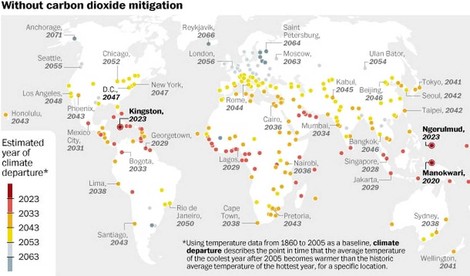Your podcast discovery platform
Curious minds select the most fascinating podcasts from around the world. Discover hand-piqd audio recommendations on your favorite topics.

piqer for: Climate and Environment Global finds
Andrea is a writer and researcher based out of Chicago. Andrea has a Bachelor's degree in environmental science from The Ohio State University and a Master's in Environmental Planning and Management at National Taiwan University, where she specialized in climate adaptation and urbanization. She writes for TaiwaneseAmerican.org, and sends out a biweekly newsletter which includes articles on politics, environment, identity, and intersections of race, class, and gender (http://eepurl.com/bPv-F5).
The Cities That Climate Change Will Hit First
When will climate change irrevocably change your city? It depends on a number of factors, such as latitude or altitude, but the day when your city crosses this bridge of no return may be closer than you expect. Scientists call this point "climate departure", a benchmark of when a local climate has really changed beyond what it has ever been. It is when "the average temperature of its coolest year from then on is projected to be warmer than the average temperature of its hottest year between 1960 and 2005".
Scientists have recently published a paper in Nature on when cities will reach this point, and the dates are alarmingly close. "Lagos, Africa's largest city, with a population 21 million and rising, is already vulnerable to flooding. It's got only 16 years before it hits climate departure. Also vulnerable are Caribbean cities such as Kingston, Jamaica, which passes the tipping point in 2023." Manokwari, in Indonesia, will hit climate departure just three years from now.
The same study also looked at the same cities under a scenario under which deep carbon emissions cuts are made. This move would buy cities valuable time in preparing adaptation and resilience measures, but would not stop climate change from progressing.
Two interactive maps are included in this article, so you can find where you might fall on the climate departure timeline. This study shows us just how important it is to be working on climate mitigation and adaptation simultaneously. Without this, we'll all be underwater sooner rather than later.
